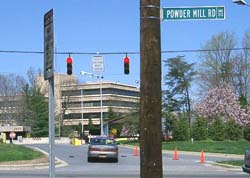|
|
|
|
Politics
|
|
Army
Research Lab is 'Good Neighbor' to Adelphi
By I-Wei J. Chang ADELPHI, Md. - Jerri Hunt remembers when she and her neighbors had to fight employees of the nearby Army Research Laboratory for parking spaces in front of their homes. "We may be able to get a space, but it wasn't in front of your house," said Hunt, 63, a retired nutritionist, while trimming her shrubs on an early Saturday afternoon. "I may have to go down the street." But the problem went away when new parking signs went up in the community. And that's about the most serious issue most folks can come up with when asked about their "good neighbor," the military lab that straddles the Montgomery and Prince George's County lines.
Many residents said they don't want to see the lab be moved or shut down when the next Base Realignment and Closure, or BRAC, list is released in May.
Neighbors do not blame the Army Research Laboratory and its 630 civilian, military and contract personnel, for example, for the heavy traffic on Powder Mill Road in morning and evening rush hours. They mostly blame commuters from Laurel and Columbia who use the road as a short cut to Beltway and, to a lesser extent, Food and Drug Administration employees expected at their new facility on the other end of the Adelphi Laboratory Center. And the Army laboratory is relatively quiet: Its operations do not include outdoor explosions like the former Naval Surface Warfare Center, whose frequent testing shook windows of many houses, neighbors said. The Navy facility has since moved on and is being slowly replaced by the FDA. Surrounded by high fences that were draped with black cloth after the 9-11 terrorist attacks, the Adelphi facility is headquarters for the U.S. Army Research Laboratory, and conducts research to enhance sensor technology for all branches of the military. "They are pre-eminent in research and development of sensor technology," said J. Michael Hayes, director of military affairs at the Maryland Department of Economic Development. "It is critically important to the Department of Defense." Michael Fluharty, chief of public affairs for the lab, said many areas of research performed at the Adelphi headquarters "will help make possible new ways to gather, interpret and share information, a prerequisite for future battlefield successes." Neither Hayes nor Fluharty would comment on the lab's chances in BRAC, but one state lawmaker said the chances of losing the base are "slim" since investments have been pouring into the Adelphi center. "At worst, the base will be renamed as part of a huge facility," said Sen. John Giannetti, D-Prince George's. "The jobs that are there will remain there." Nearby residents hope he is right. "I think it would be more bad than good, frankly," said Victor Musick Jr., a retiree, of the prospect of closing the lab. "Every time you have a military closing of any size, you've got a lot of people out of work." County economic development officials agreed. They could not provide a specific figure for the Army lab, but said that federal procurement in research and development in Prince George's County reached $551 million in 2000 and is a major component of the county's economic growth. "We hope that it won't be closed because it is an important economic generator for the county," said Kwasi Holman, president and chief executive officer of the Prince George's County Economic Development Corp. Local businesses, from groceries to family restaurants, said also like having the base. At the Safeway in Hillandale, the closest commercial area to the base's main gate, store manager Kyle Johnson said losing the base would have an adverse effect on his grocery. Businesses in the Calverton shopping center, a little farther from the base, shared that sentiment. LaDonna Taylor, the front-end manager at Giant, said base employees often come to the grocery. While their impact is "minimal," it is still good for business, she said. The owner of TJ's of Calverton said she sees about 100 base employees at her restaurant each month, many of whom are regulars. "We know many of the folks by face and by name," said Karen Murray, who owns the restaurant with her husband, Tim. "It would be really tragic to see a fairly large complex, something that large and meaning that much to the community, close." Ted Hadeed, 62, a subcontractor who lives near the lab, worries that if the base were to close, it might be replaced by townhouses. "They'd bring different people in the area -- just like they did with Calverton, when they put up apartments and townhouses," Hadeed said. "Now the crime is way up in that area." Another resident who hopes the base stays said he was thinking of the employees whose lives would be disrupted by a move. "I've been through that myself. I've been with the government and I've moved from one state to another, and it's not a very nice thing to occur to a family," said George Miller, 83, a retired federal worker who was working on his lawn. "My own personal feeling is, 'Leave them alone. They are good neighbors'."
Copyright ©
2005 University of
Maryland Philip Merrill College of Journalism
|


